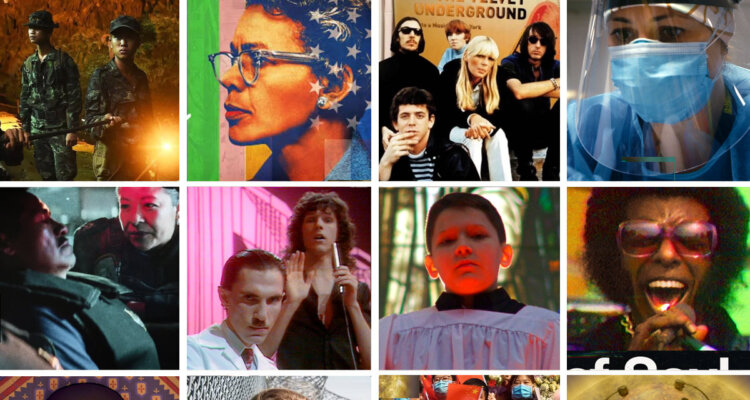“Writing with Fire”
Directed by Rintu Thomas and Sushmit Ghosh, “Writing with Fire” documents the hardworking, pioneer women journalists of the Indian news organization Khabar Lahariya, as they face significant obstacles in being heard related to their low status in the caste system and their gender. But with iPhones in hand and a desire to uncover the truth, journalists like Meera help build their audience and ask tough questions to officials who either try to blow them off or use talking points. The scenes of them pushing back against dismissive figures provide some of the movie’s significant victories, the same with montages that show how their YouTube channel gets thousands and thousands more followers while bringing change to life issues for citizens that were previously ignored. “Writing with Fire” puts a spotlight on those who carry the tenets of effective journalism, while also stoking the belief that in spite of the many forces designed to silence those not in power, there are still many more people out there who are hungry to be recognized. – NA
“Jacinta”
The filmmaking method known as cinéma-vérité is one of the most effective when it comes to documentaries. Why stop the film for talking-head interviews or narration? Just let the subjects and the footage speak for themselves. And one of the most startling uses of that technique in 2021 has to be the Hulu film “Jacinta.” Filmed over the course of a few years, Jessica Earnshaw’s haunting, heartbreaking film tells the story of a young girl, Jacinta, as she goes back and forth with stints in jail due to her drug addiction. And while locked up, she is confronted with her past, as she shares a penitentiary with her mother, who also suffers from drug addiction. “Jacinta” is a story of motherhood and addiction, told through the devastating lens of reality. No punches are pulled. No corners are cut. Earnshaw has crafted an incredible documentary that shows how the cycle of abuse and addiction can span generations. It’s not an easy watch, but “Jacinta” might actually be hard-hitting enough to change lives. – Charles Barfield
“Summer of Soul (… Or, When the Revolution Could Not Be Televised)”
The wonders of Questlove’s debut documentary “Summer of Soul” are immense, and work twofold. In one manner, it is the loving resurrection of footage of the 1969 Harlem Cultural Festival, a historic gathering that has been forgotten in time, even though it rightfully earned the name of “the Black Woodstock.” The line-up was incredible, with all of its performers in fine form: Nina Simone, Stevie Wonder, Mahalia Jackson, The Staple Singers, Sly and the Family Stone, and many more. But Questlove uses this footage, found after 50 years, to engage the history of Black America, connecting the songs and their performers to historical context and chapters that provide a foundation for the event itself. Questlove marries these two ebullient qualities with his modern interviews, which have attendees and some performers reflecting on that period. Breaking from conventional filmmaking ever so slightly, Questlove films his subjects so that they’re watching footage from a memory they may have never seen outside of their own eyes; the reflection of the footage offers the twinkle of a memory, of a piece of their own lives they may not have been able to see in this manner until now. – NA
“Procession”
As “A Cop Movie” and several other docs proved, 2021 was the year doc filmmakers really tried to break the form and blur fact and fiction. Doc filmmaker Robert Greene is already that doc-form buster, having created similar films like “Bisbee ’17,” “Kate Plays Christine,” and “Actress.” His latest is perhaps the most harrowing and moving film of his career thus far and centers on six men who were sexually abused by Catholic clergy as boys. They become a makeshift family and find empowerment by undergoing dramatic therapy and creating films inspired by their trauma. These are men whose lives have been borderline ruined, they’ll never fully recover, and they’ll wrestle with these emotional demons until the very end, and that is tough and grueling stuff to watch. Then they recreate their traumas, and we watch as they shudder in horror, but also reclaim their lives, taking back what is part of their life and diminishing the nightmares that have haunted them for ages. It’s bruising stuff and the trust that these men put in Greene is deeply earned and affecting. – RP
“The Sparks Brothers”
Edgar Wright gave movie lovers a special gift this past year when he decided to make his first documentary, and nonetheless about his favorite band, Sparks. “The Sparks Brothers,” a 140-minute initiation into a cult that comes with 50 years of songs, is an exciting piece of filmmaking that also masters the oft-made documentary about a band that never got the attention or the credit they deserve. But Wright’s in-detail passion for the band, which goes album by album through the history of the American brothers and shows their many before-their-time innovations with dance-ready music, builds its own infectious pacing. Not to mention that he packs the film with black-and-white interview testimonies from music gods like “Weird Al” Yankovic, Todd Rundgren, Thurston Moore, Flea, Beck, and Björk, who appears off-camera. Wright caters the documentary—as energetic as his narrative features—like a celebration for a band that you may not have known before but will be seeking out immediately afterward. – NA

